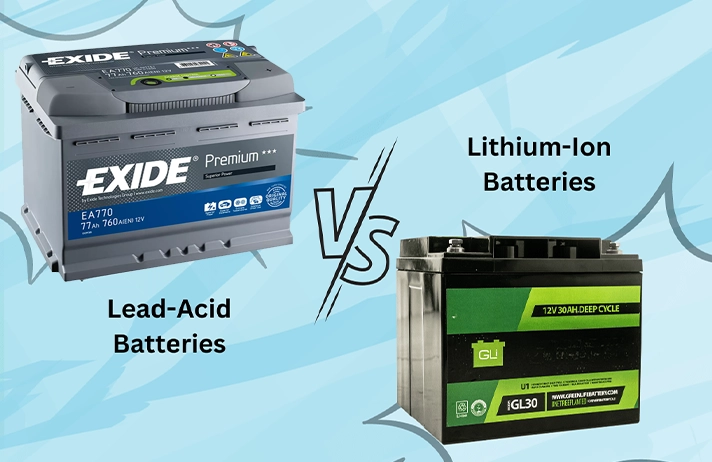Uninterruptible power components (UPS) always have typically used valve-regulated lead acid (VRLA) batteries. Lead-acid batteries offer excellent benefits, such as cost, overall performance, and security costs for data center environments.
However, modern technology now challenges the dominance of VRLA batteries in UPSs. Lithium-ion batteries are more suitable for UPSs inside the data center. Although the rate is excessive, lithium-ion batteries are high-quality for statistics middle UPS applications. If you plan to shop for batteries for your enterprise, read more about how to select business UPS batteries.
In this blog, We will explore the implications of the differences in battery technology related to uninterruptible power supplies below.

Advantages of Lithium-Ion And Lead-Acid UPS Batteries
More CompactLithium-ion batteries have a higher strength density than other battery technology. A 1 kg lithium-ion battery can hold a hundred fifty watt-hours of electricity. That's six times more than a 1kg VRLA battery. Due to the lighter battery weight, lithium-ion UPSs have a smaller size in contrast to VRLA UPSs. That is very useful where space is confined.
Extended lifespanThe term "life cycle" indicates how long a battery may be charged and discharged at some point in its useful lifespan. Although the number of charge/discharge cycles of lithium-ion batteries can take care of is decided by the release depth, they can undergo hundreds of cycles. Additionally, they do not have reminiscence results and don't want to be completely tired before recharging. A UPS battery with a prolonged lifespan necessitates much less frequent replacement.
Quicker ChargingBattery charging times are essential in data center operations, especially when reliability is essential. Lithium-ion UPS batteries take approximately two hours to charge fully. In contrast, lead-acid UPS batteries need as long as 24 hours to charge again.
Increase in Depth of DischargeA battery's "depth of discharge" represents the percentage of its total capacity used in a single cycle. Several manufacturers will indicate the maximum advised depth of discharge for the best battery performance. Lithium-ion batteries can be discharged up to 85% or more, giving the uninterruptible power supply extra energy during each cycle.
Increased Operating TemperatureThe temperature at which the battery operates encourages its lifespan. Lithium-ion UPSs can function at temperatures as high as 105 stages, whereas lead-acid UPSs are recommended to be operated within a temperature range of 68 to 77 degrees. The cooling requirements for lead-acid UPSs are similar to those of IT devices, which results in high operational fees for data centers.
Efficient Use Of Energy"Efficiency" is the proportion of energy obtained from a battery compared to the power given to the battery. The performance of the majority of lithium-ion batteries is 95% or higher. A lithium-ion UPS running at maximum capability can lower electricity waste within the statistics center compared to previous technologies. If you are looking for UPS batteries for longer backups, then Microtek smart hybrid digital & sinewave technologies UPS model is the best choice for your home or industry.
Low MaintenanceLithium-ion UPSs, such as the Hykon Solar Power Packs, are generally low-maintenance and usually only require an annual torque check. IT personnel also will only need to replace batteries occasionally. Lithium-ion batteries can survive for up to ten years, about the same period as an uninterrupted power supply. On the other hand, VRLA UPS batteries need to be modified every three to five years.
Reduce Expenses In The Long RunThe value of buying an uninterruptible power supply is the most influential factor in determining ownership expenses. Installation, electricity and cooling necessities, safety, and the desire for alternative batteries should additionally be considered. When it comes to durability, lithium-ion batteries are more satisfactory than lead-acid batteries.
Durability and Cost Comparison: Lithium-Ion vs. Lead-Acid
When choosing the first-rate UPS battery for your property or commercial corporation, it is important to consider the pros and cons of Lithium-ion and lead-acid batteries. Here is a detailed analysis to help you in making a well-knowledgeable preference:
Battery Durability And RobustnessChoose The Best UPS Batteries For Residential or Commercial
Finally, it’s critical to consider the professionals and cons of both lithium and lead acid batteries while deciding on the first-rate UPS battery for your house or enterprise. Therefore, Lithium batteries are most suitable for businesses in terms of expenses because they have a longer life span, are extra efficient, and require less frequent maintenance. Lead acid batteries are cheaper in terms of the initial cost and widely available, which makes them suitable for more minor or short-term usage.
At Perfect Energy, we are one of the best UPS distributors in Coimbatore. We offer a range of high-quality UPS suitable for your precise power requirements. Our professional team will help you choose the correct UPS battery for your home or office to ensure constant power.
